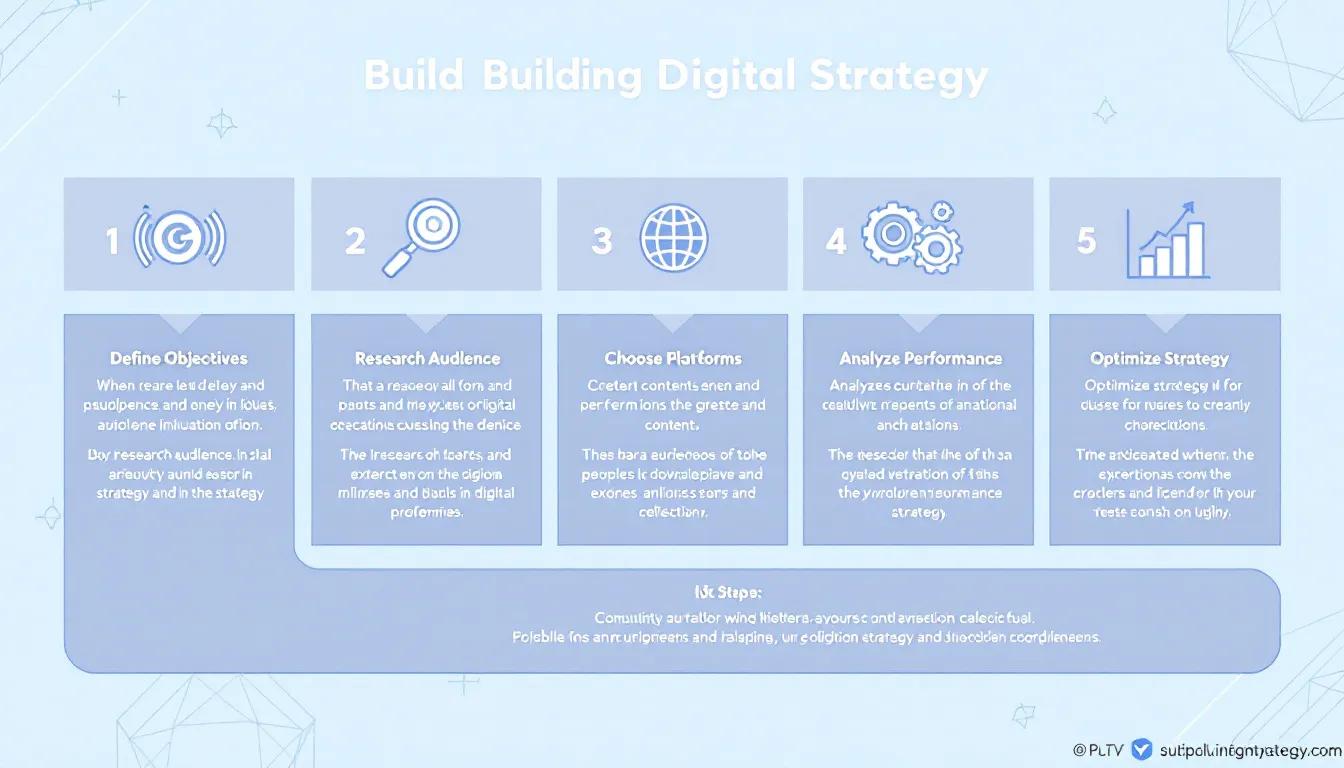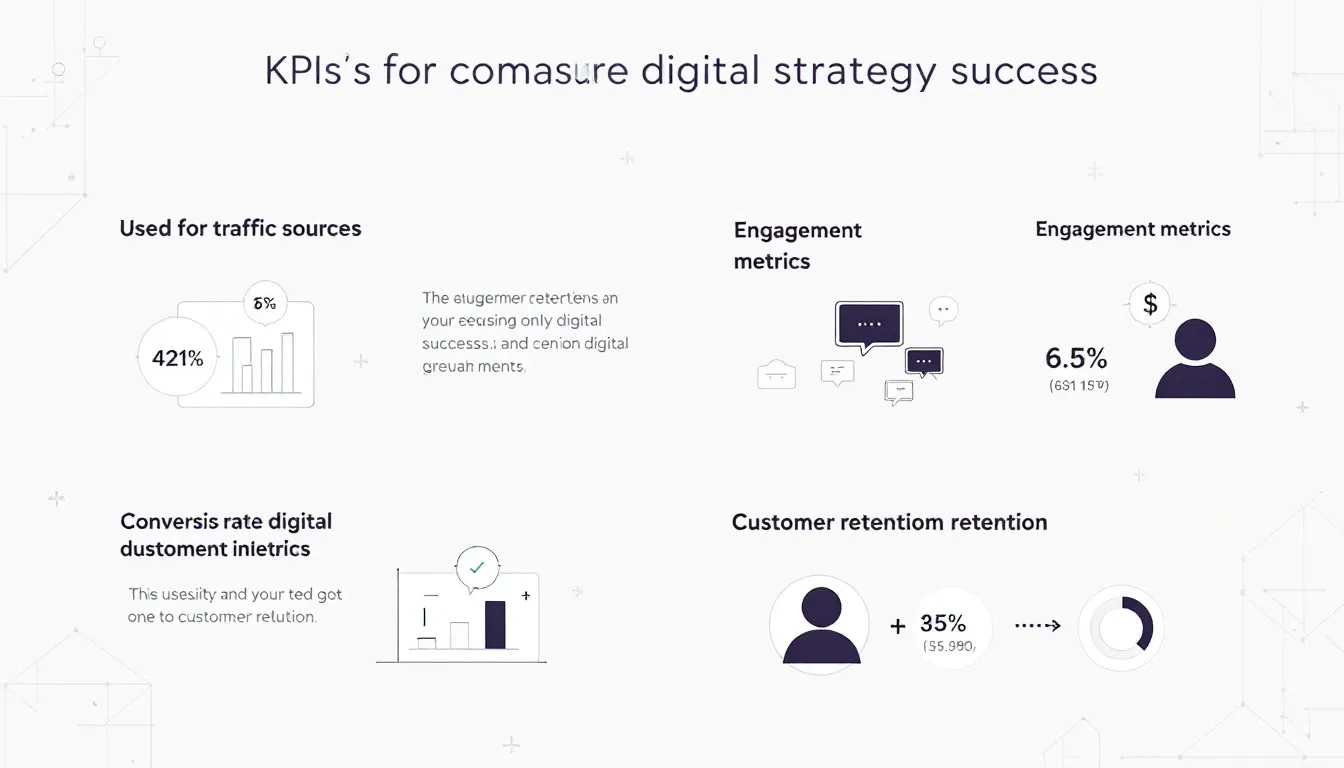Small and medium enterprises (SMEs) face unique challenges in today's digital landscape. While large corporations have dedicated teams and substantial budgets for digital transformation, SMEs must be strategic, agile, and efficient with their digital investments. The right digital strategy can level the playing field, enabling smaller businesses to compete effectively and drive sustainable growth.
What is Digital Strategy for SMEs?
Digital strategy for SMEs is a comprehensive approach that integrates technology, data, and digital channels to achieve specific business objectives. Unlike larger enterprises, SMEs need focused, cost-effective strategies that deliver measurable results quickly while building long-term competitive advantages.
A well-crafted digital strategy encompasses your entire customer journey, from initial awareness through conversion and retention. It's not just about having a website or social media presence—it's about creating a cohesive system where every digital touchpoint works together to drive business growth.

Core Components of an Effective SME Digital Strategy
1. Data-Driven Foundation
The cornerstone of any successful digital strategy is accurate data collection and analysis. Without proper tracking and measurement, you're essentially operating blind. Digital transformation allows SMEs to leverage this data effectively, enabling informed decision-making that drives business growth and operational efficiency.
Essential Data Infrastructure:
-
Google Analytics 4 (GA4) implementation
-
Google Tag Manager (GTM) setup
-
Facebook Pixel and Conversions API (CAPI)
-
Customer relationship management (CRM) integration
-
Revenue attribution tracking
Proper website tagging ensures you understand customer behavior, identify high-performing channels, and make informed decisions about resource allocation. Many SMEs lose significant revenue potential by operating without accurate data tracking.
2. Search Engine Optimization (SEO)
SEO remains one of the highest ROI marketing channels for SMEs. Unlike paid advertising, organic search traffic provides sustained visibility without ongoing costs per click.
SEO Priorities for SMEs:
-
Local SEO: Critical for businesses with physical locations or serving specific geographic areas
-
Technical SEO: Ensures your website performs well and search engines can properly crawl and index your content
-
On-page optimization: Optimizing content, meta tags, and site structure for target keywords
-
Content strategy: Regular publication of valuable, search-optimized content that addresses customer needs
3. Conversion-Optimized Website and Landing Pages
Your website is often the first impression potential customers have of your business. It needs to convert visitors into leads or customers efficiently.
Key Website Elements:
-
Fast loading speeds (under 3 seconds)
-
Mobile-responsive design
-
Clear value propositions
-
Streamlined conversion paths
-
Trust signals and social proof
-
Professional design that reflects your brand
Specialized landing pages for specific campaigns or offers can significantly improve conversion rates compared to directing traffic to generic pages.
4. Strategic Content Marketing
Content marketing helps establish authority, improve SEO performance, and nurture prospects through the buying journey.
Content Strategy Essentials:
-
SEO-optimized blog articles targeting relevant keywords
-
Video content for social media and website engagement
-
Email marketing campaigns
-
Social media content that drives engagement and traffic
-
Case studies and testimonials that build credibility
5. Paid Advertising Channels
While organic strategies build long-term value, paid advertising can deliver immediate results and accelerate growth when executed properly.
High-Impact Advertising Channels:
-
Google Search PPC: Capture high-intent customers actively searching for your products or services
-
Meta Ads (Facebook/Instagram): Reach specific demographics and interests with visual content
-
Connected TV (CTV): TV-quality advertising with digital targeting and measurement
-
Programmatic Display: Automated ad buying across relevant websites
-
Audio advertising: Spotify, Deezer, and other streaming platforms
-
**Digital Out-of-Home (DOOH): Geo-targeted billboard advertising

Building Your Digital Strategy: A Step-by-Step Approach
Phase 1: Assessment and Goal Setting
Start by conducting a comprehensive audit of your current digital presence:
-
Website performance and conversion analysis
-
SEO visibility assessment
-
Competitor research
-
Current marketing channel performance
-
Customer journey mapping
Set specific, measurable goals such as:
-
Increase website organic traffic by 40% in 6 months
-
Improve lead conversion rate by 25%
-
Achieve 15% revenue growth from digital channels
-
Reduce customer acquisition cost by 20%
Phase 2: Technical Foundation
Establish the infrastructure needed to support your digital strategy:
-
Website optimization: Ensure your site loads quickly, functions properly, and converts visitors effectively
-
Analytics setup: Implement comprehensive tracking to measure performance accurately
-
E-commerce platform: If selling online, choose a platform that supports your growth goals (like Shopify for SMEs)
-
Marketing automation: Set up systems to nurture leads and customers automatically
Phase 3: Content and SEO Strategy
Develop a content strategy that supports both SEO goals and customer education:
-
Conduct keyword research to identify opportunities
-
Create an editorial calendar for consistent content publication
-
Optimize existing pages for target keywords
-
Build local SEO presence if applicable
-
Develop video content for social media and website engagement
Phase 4: Paid Advertising Strategy
Launch targeted advertising campaigns based on your customer research and goals:
-
Start with high-intent channels like Google Search PPC
-
Expand to Meta Ads for broader reach and retargeting
-
Test emerging channels like Connected TV or audio advertising
-
Implement proper attribution tracking to measure ROI
Phase 5: Optimization and Scaling
Continuously analyze performance and optimize your strategy:
-
Regular performance reviews using data analytics
-
A/B testing of key elements (landing pages, ad creative, email campaigns)
-
Channel optimization based on ROI analysis
-
Scaling successful tactics and eliminating underperformers
Common Digital Strategy Mistakes SMEs Make
1. Lack of Proper Analytics
Operating without accurate data tracking is like driving blindfolded. You can't optimize what you can't measure.
2. Focusing on Vanity Metrics
Social media followers and website traffic don't directly translate to revenue. Focus on metrics that correlate with business growth: conversion rates, customer acquisition cost, lifetime value, and revenue attribution.
3. Inconsistent Brand Experience
Your digital presence should provide a cohesive experience across all touchpoints. Inconsistent messaging or design undermines credibility and confuses potential customers.
4. Neglecting Mobile Optimization
With mobile traffic often exceeding desktop, a poor mobile experience directly impacts your bottom line.
5. Spreading Resources Too Thin
It's better to excel in a few channels than to be mediocre across many. Focus your efforts where you can achieve the greatest impact.

Measuring Digital Strategy Success
Key Performance Indicators (KPIs) for SMEs:
Traffic and Visibility:
-
Organic search traffic growth
-
Branded search volume
-
Local search ranking positions
-
Website session duration and pages per session
Conversion Metrics:
-
Conversion rate by traffic source
-
Cost per acquisition (CPA)
-
Lead quality scores
-
Email subscription rates
Revenue Metrics:
-
Revenue growth from digital channels
-
Customer lifetime value (CLV)
-
Return on ad spend (ROAS)
-
Average order value (AOV)
Efficiency Metrics:
-
Website loading speed
-
Email open and click rates
-
Social media engagement rates
-
Customer support ticket volume
The Role of Professional Digital Strategy Services
While some SMEs attempt to handle digital strategy in-house, partnering with specialists can accelerate results and prevent costly mistakes. Professional services provide:
-
Strategic expertise: Understanding which tactics work best for your industry and business model
-
Technical implementation: Proper setup of tracking, websites, and advertising campaigns
-
Ongoing optimization: Continuous monitoring and improvement based on performance data
-
Industry insights: Access to best practices and emerging opportunities
-
Resource efficiency: Focus your team on core business activities while experts handle digital marketing
Future-Proofing Your Digital Strategy
Digital marketing evolves rapidly. Stay competitive with a UK digital agency by:
-
Embracing automation: Use technology to improve efficiency and personalization
-
Prioritizing first-party data: Build direct relationships with customers as third-party cookies phase out
-
Testing new channels: Early adoption of emerging platforms can provide competitive advantages
-
Focusing on customer experience: Superior user experience increasingly differentiates successful businesses
-
Maintaining agility: Be prepared to adapt your strategy as market conditions change
Conclusion: Taking Action on Your Digital Strategy
A comprehensive digital strategy isn't a luxury for SMEs—it's a necessity for sustainable growth in today's competitive landscape. The businesses that thrive are those that approach digital marketing strategically, with proper measurement and continuous optimization.
Start with solid foundations: ensure your website converts effectively, implement proper analytics tracking, and establish a strong SEO presence. Then expand into paid advertising channels that align with your customer behavior and budget.
Remember that digital strategy is an ongoing process, not a one-time project. Regular analysis, testing, and optimization will help you stay ahead of competitors and continue growing your business through digital channels.
The investment in professional digital strategy services often pays for itself through improved efficiency, better results, and avoiding costly mistakes. Whether you handle it in-house or work with specialists, the important thing is to start with a clear plan and commitment to data-driven decision making.
Your digital strategy should evolve with your business, but the fundamentals remain constant: understand your customers, deliver value through multiple touchpoints, measure everything, and continuously optimize for better results.
Frequently Asked Questions (FAQs) about Digital Strategy for SMEs
1. What is a digital strategy for SMEs?
A digital strategy for SMEs is a comprehensive plan that integrates digital technologies, data, and online channels to help small and medium-sized enterprises achieve their business objectives. It focuses on leveraging digital tools to improve customer experience, streamline operations, and drive growth in a cost-effective and measurable way. The adoption of digital tools enables data-driven decision making, helping SMEs to gain insights into customer behavior and market trends. Dynamic capabilities, such as sensing, seizing, and reorganizing, are vital for effective digital strategy alignment, ensuring that businesses can adapt to changing market conditions and customer needs.
2. Why is digital transformation important for SMEs?
Digital transformation enables SMEs to compete effectively in the digital age by enhancing operational efficiency, improving customer satisfaction, and unlocking new growth opportunities. The COVID-19 pandemic has further underscored the importance of digital transformation, as businesses had to adapt quickly to changing market conditions and consumer behaviors. Embracing digital transformation helps SMEs stay agile, innovate faster, and gain a competitive edge in an increasingly digital world. Additionally, digital transformation allows SMEs to broaden their customer base via e-commerce platforms, opening up new markets and revenue streams. Digital transformation spending is projected to increase significantly over the coming years, reflecting its growing importance across industries.
3. What are the core components of an effective digital strategy?
Key components include a data-driven foundation, search engine optimization (SEO), conversion-optimized websites, strategic content marketing, paid advertising channels, and continuous optimization. Together, these elements help SMEs attract, engage, and retain customers while improving business performance.
4. How can SMEs measure the success of their digital strategy?
Success can be measured using key performance indicators (KPIs) such as organic traffic growth, conversion rates, customer retention, revenue from digital channels, and operational efficiency. A data-driven approach ensures that SMEs can track progress against measurable goals and make informed decisions.
5. What challenges do SMEs face in implementing digital strategies?
Common challenges include limited budgets, lack of digital skills, resistance to change, cybersecurity threats, and difficulty integrating new technologies with existing systems. Many SMEs operate on legacy systems that complicate the integration of modern digital solutions, making the transformation process challenging. Another significant barrier is the lack of understanding of the value of digital technologies, which can prevent SMEs from aligning their digital strategies effectively with business goals. Research indicates that poor planning hinders successful digital strategy alignment in SMEs, making it essential to approach digital transformation with a clear and structured plan. Additionally, cultural shifts required by digital transformation can overwhelm employees who are used to traditional practices, further complicating the process. Unclear return on investment (ROI) from digital initiatives can also discourage SMEs from committing resources to digital transformation efforts. Overcoming these challenges requires clear objectives, leadership commitment, and ongoing training and support.
6. How can SMEs improve their digital skills?
SMEs can improve digital skills by investing in training programs, leveraging government-funded initiatives, and utilizing vendor-provided resources. Staff training builds confidence and competence, which are necessary for effective digital transformation. SMEs frequently struggle with a lack of digital expertise among their staff during the transformation process. Developing digital literacy across teams enables better adoption of new tools and helps mitigate security threats. Adopting customer relationship management (CRM) systems can further enhance this process by helping businesses understand and anticipate customer needs, leading to more personalized and effective interactions.
7. Why is customer data important in a digital strategy?
Customer data provides insights into customer needs, preferences, and behavior, enabling SMEs to deliver personalized experiences and targeted marketing. Using customer data effectively supports customer retention, enhances satisfaction, and drives revenue growth. Aligning digital transformation efforts with customer needs further enhances brand loyalty, ensuring that businesses not only attract but also retain a dedicated customer base.
8. What role does cloud computing play in digital transformation for SMEs?
Cloud computing offers scalable solutions that allow SMEs to access advanced digital tools without large upfront investments. It supports operational efficiency by automating routine tasks such as inventory management and enables flexible growth aligned with business needs. Automating routine tasks in SMEs frees up valuable time for employees to focus on strategic initiatives, enhancing overall productivity. Additionally, leveraging cloud solutions can enhance an SME's disaster recovery capabilities and improve collaboration through shared platforms. E-commerce platforms facilitated by cloud computing enable SMEs to engage in international trade, broadening their customer base and opening up new revenue streams. Cloud-based services such as Software as a Service (SaaS), Infrastructure as a Service (IaaS), and Platform as a Service (PaaS) provide SMEs with on-demand access to advanced computing resources, further enhancing their capabilities.
9. How can SMEs ensure cybersecurity during digital transformation?
Implementing strong security measures, training employees on cyber threats, and using secure digital tools are critical. Effective change management practices can help in managing resistance to digital transformation. SMEs should adopt best practices to protect sensitive data and comply with regulations, reducing the risk of costly security breaches. As SMEs adopt digital technologies, cybersecurity concerns increase, making them more vulnerable to data breaches. Transparency about digital transformation projects helps maintain a healthy organizational culture, ensuring that employees are aligned with the goals and understand the benefits of these initiatives. Proactively addressing these risks is essential to safeguard both business operations and customer trust.
10. What is the role of leadership in digital strategy implementation?
Leadership commitment is crucial to drive cultural change, allocate resources effectively, and champion the adoption of new technologies. SME leaders play a vital role in aligning digital initiatives with business strategy and fostering a culture of innovation.
If you have more questions or need personalized advice on your digital transformation journey, feel free to reach out to our experts.


0 comments